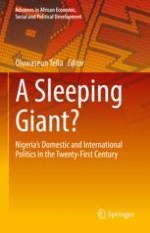2021 | OriginalPaper | Chapter
Domestic and Geopolitical Complexities of Nigeria-Egypt Relations: A Decolonial Perspective
Author : Ahmed Haroon Jazbhay
Published in: A Sleeping Giant?
Publisher: Springer International Publishing
Activate our intelligent search to find suitable subject content or patents.
Select sections of text to find matching patents with Artificial Intelligence. powered by
Select sections of text to find additional relevant content using AI-assisted search. powered by
